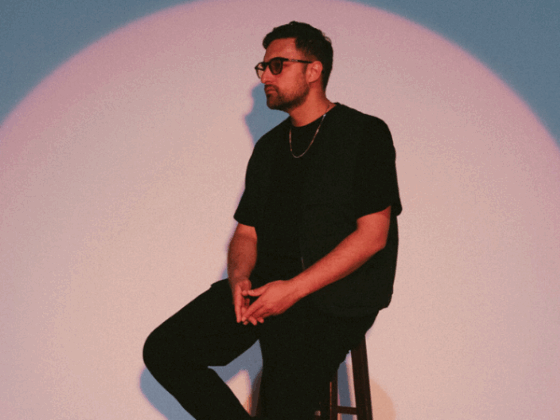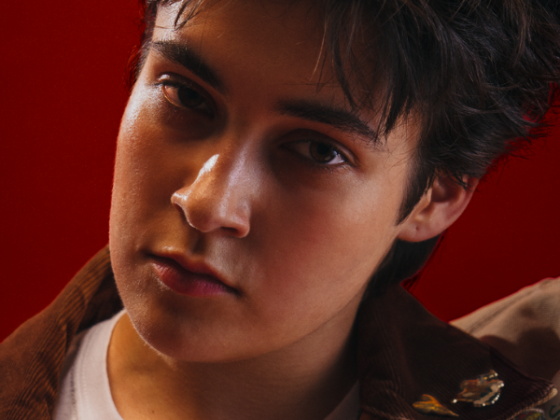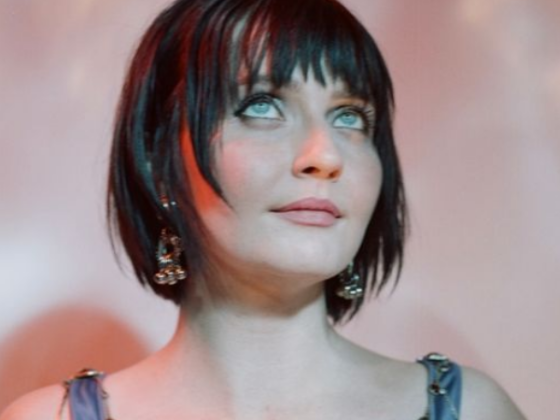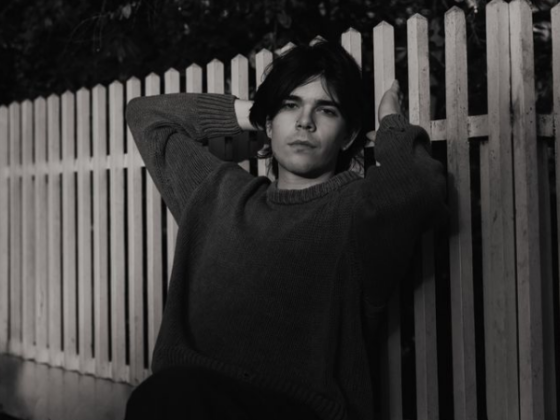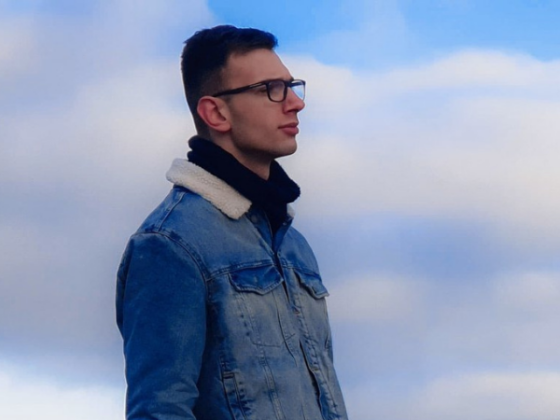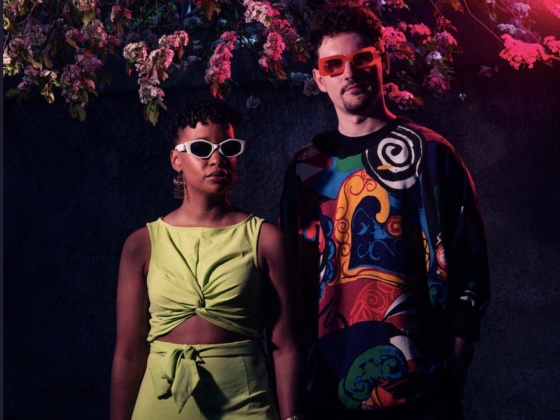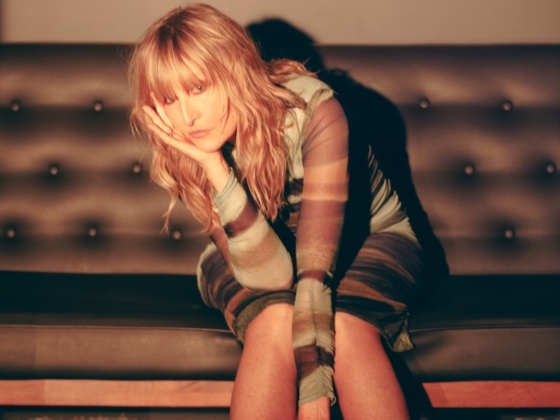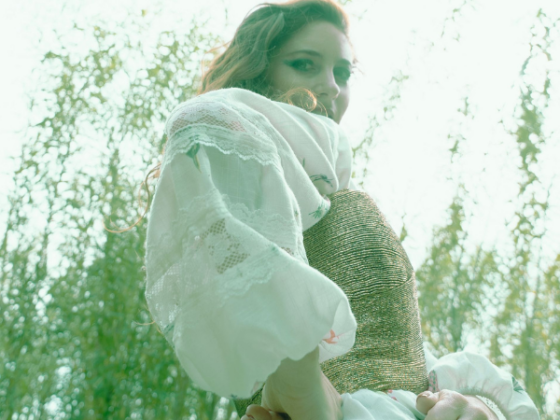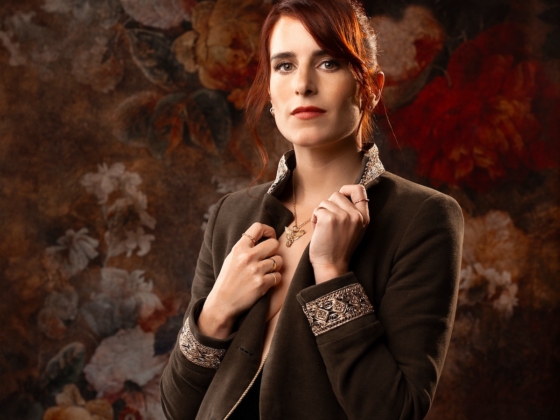Canadian avant-pop duo Bibi Club, made up of Adèle Trottier-Rivard and Nicolas Basque, have created a community hub—not only for fans who are instantly moved by their music, but also for the family they’ve built and the close-knit circle they hold dear.
As a couple, band partners, and parents, the duo wears many hats, but at its core, connection drives their music, their message, and even the inspiration behind their name.
On stage at this year’s Festival De Musique Émergente (FME) in Rouyn-Noranda–Abitibi-Témiscamingue, Québec, the crowd experienced that connection firsthand, feeling the tension the duo built and released during their headline set.
Speaking with them via Zoom from the comfort of their home, they discussed all things Bibi Club: their hopes, inspirations, creative process, and dream collaborations
For those who are new to your music, could you share a bit about how Bibi Club first came to be and what inspired the name?
Nicolas: Well, we met through different projects—Adèle and me—we were both musicians in different projects. I had another project called Plants and Animals, and Adèle came with us on tour as a musician and singer, and at some point, we exchanged a lot of music together.
We got along and we liked each other’s musical instinct.
When we got back from tour, we started working on compositions together, and I think that's how it started. It was like a naive exchange, trying to encourage each other to do our own project, and it became Bibi Club.
The name Bibi Club comes from when we were looking for a name, and Adèle was taking a rest. We have a lot of kids in our house—people always coming in and out. It’s always a bit chaotic, which is sometimes crazy and sometimes comforting in a good way.
Adèle calls everybody that she likes “Bibi.” It comes from her aunt, who is from Morocco and would call her Bibi. People say “Habibi” a lot there.
Adèle: Which was like, this is the people I like club—it’s my ‘Bibi Club.’ It's our little community.
How would you describe your sound and musical identity right now? Has it changed at all since you first started making music?
Adèle: I’d say we make avant-pop music—it’s a genre I really relate to. We’re being more affirmative with our sound.

Pictured: Adèle Trottier-Rivard of Bibi Club singing at Festival de Musique Émergente (2025). Photo Credit: DMC Photographe
For the past few years, we’ve been searching and exploring, and it all comes alive on stage during our live performances. We really dive into our sound and our music. It’s the best way to discover ourselves and learn about ourselves musically.
Maybe now there’s a bit more tension in our sound than there used to be.
Nicolas: Yeah, I'd say now we're in an era where our music sounds—or tastes—like dirt or the Earth.
It’s grounded, and I feel that’s what we’re going after. There’s a sensibility you can feel in your body. That’s what we’re after when we’re in the studio.
We think of it as not necessarily something dirty, but music that’s close to the ground, maybe a bit heavier in a way.
What does your creative process look like? Do you usually start with instruments and a set structure, or is it more free-flowing? Has your process changed over time?
Nicolas: It's kind of often the same way we write down ideas. Like we said, our house is a busy place, so if we have one of our kids in the bath and we have a minute, we’re often in a state of emergency—in a weird way, and in a calming way too.
It’s like, “Oh, we have this idea, record it on guitar or vocal, whatever it is, on a phone, leave it there, and then we’ll go to the studio at some point, book studio time, check our ideas, and build a song from there.” Again, really instinctively.
A bit like a puzzle, too. We move quick—just the two of us—when we work, and when we write music, we're just the two of us. And we try to trust. And I'll talk about myself: I trust Adèle's instinct—the musical instinct I trust the most. So if she says that’s the direction, I go—and I think it works the same the other way around?
Adèle: Yes.
Nicolas: And it tends to start with music. Adèle often writes lyrics because I tend to engineer the session while plugging cables, and then we rework the lyrics while recording.
Sometimes, once we have a song, it informs the other song, and they kind of answer to each other.
Yeah, it's a bit like a puzzle. You know when you make a puzzle? You have the frame, and then you're like, “Oh, now I see it,” and then it all comes together?
Music comes first, more often, like the melodies and maybe the production, before the lyrics. We record while we write. We try not to overthink or overwork anything. If there's a mistake, we leave it. Maybe it opens a door to something else, or like, “Oh, we didn’t see that we could go there.”
Yeah, that's the thing—we're trying to be careful not to overwork it. When we work with collaborators, like a mixer or for artwork, we try not to let people overwork anything—just go, trust them, and help them trust their instinct, physically.
Can you talk about the themes discussed on your most recent album and the inspiration behind the songs?
Adèle: The name of the album is Feu de garde. The Google translation means ‘Watch Fire.’
So, watch fire was the first inspiration, I would say—the first phrase that really inspired us. It's a military phrase, so there's no real connection to our themes on the record. But the phrase itself really spoke to us because, in times of war, it's the fire that is maintained—keeping people warm and making them feel protected and safe. We kind of translated that to our reality.
There are a lot of themes on the record; we talk about the people who are close to us, our little community, as we mentioned..
Also, there’s a theme of contemplation, but I don’t want to sound too vague because contemplation can sound like you’re just there, in a peaceful mode, which isn’t really what we were looking for. It’s more about finding some sort of comfort in the chaos.
Yeah, we talked a lot about fatality—death, but also the fatality of life. Because we’re parents, much of the record focuses on parenthood. But it also extends to our relationships with other people we love, touching on themes of community and the inevitability of life.
Nicolas: There’s also stuff about anxiety. A lot of songs where we just name things we see, or talk about something happening around us. In a way, it comes from touring a lot and being anxious—like being in a park and naming stuff around you just to calm yourself. So there’s that aspect.
Adèle: I think nature is always in there, because it’s a place where we feel comfortable, grounded—where again, there’s a lot of chaos, but it’s a comforting chaos. There are no straight lines in nature. Everything’s curved and weird.
In a way, we related that concept to our music, like Nico was saying. He talked about instinct and not overworking anything.
There’s this interesting connection to nature where it’s kind of chaotic, but not violent. There’s tension without violence, and we like having this image when we play LIVE—creating tension with our instruments.
It’s not violent at all, but still, you can feel the emotion. We feel a lot of emotions when we play.
Nicolas: But I would say, overall, our key theme is community.
There are references to when Adèle was in the Girl Scouts, when she was young—so there are references to learning to sing on that record especially, being in a group at night, what you’d do to comfort yourself, to celebrate the achievement of the day, and to go beyond what you thought you could do.
Just all these themes put together.
What are your artistic influences on your music? They can come from any form of art.
Nicolas: For me, I think a lot about theatricality when we play music. We didn’t have our lighting person with us at FME, and she’s usually the one who thinks about those things all the time.
Good theater or dance often influences us, I find, because it lingers after it’s over. A music show is different—you can listen to the songs again afterward and relive the experience. But with theater, you go home and keep thinking about it, and that sticks with me.

Pictured: Nicolas Basque of Bibi Club performing at Festival de Musique Émergente (2025). Photo Credit: DMC Photographe
Since it’s just the two of us on stage, I think a lot about movement—how it can make you feel gigantic on stage.
I want to create that kind of impact, like when you’re a teenager and you see a play that makes you think, “That’s what I want to do with my life,” or “I want to be part of that,” or even, “I just learned something from this.”
That’s the kind of feeling I’m chasing.
Adèle: It’s hard—there are so many things that inspire me. When we actually started the project, it felt like for a few years, I didn’t really understand where I wanted to go with my voice. I didn’t know if I wanted to write in French or in English, and it wasn’t really clear. I didn’t know where to go.
I really played with my voice, and I’d been listening a lot to Stereolab. They came out when I was young. It was the first time I was listening to a woman who sang both in French and in English, you actually can't really notice, it’s just part of the music, it’s like another instrument in the song, and it really spoke to me.
Because the singer has this way of singing where it becomes more than a language—it’s part of the music. It creates an emotion.
She sings with honesty, and that really spoke to me.
I remember we started writing in French, trying that, and it felt natural. I could really feel that I was being myself when I sang.
That was a big inspiration for me—maybe more for the lyrics side. And also, as a woman in music, to be proud of my voice and try to find my own language, in a way.
Do you have any upcoming projects that you're excited about releasing?
Nicolas: Yes, we finished a new album that will be released in October 2026, so we’re excited.
We performed two new songs at FME, and it was fun to play them. I mean, we took risks because there was one we hadn’t really rehearsed, but we just jumped in, and it felt good. So that was fun, yeah.

Pictured: Adèle Trottier-Rivard and Nicolas Basque of Bibi Club performing at Festival de Musique Émergente (2025). Photo Credit: DMC Photographe
What lyrical themes are you exploring on your upcoming album?
Adèle: Yeah, this record is mainly inspired by death. We had close people die in the last year, and it really inspired us, of course, to create—to try to find a way to just release something out of it and create something.
But it's more than that. It's death, but there's always a bit of light in all of this, some hope.
Nicolas: It’s not fully dark and depressing. It's more about death and life.
Adèle described it while we were working—she often said it should feel like you're fencing in old Greek rooms and dancing with a primal energy.
So there's a tension. I think it is inspired by things that happened, but it's also about life, because a recurring theme is the desire to live and to love.
That’s the tension—you can't have one without the other. It’s also colored by everything happening right now, like in Palestine, and all of that.
Yeah, there's something we're trying to embrace with emotions—pushing the emotion to the extreme. That’s what we're doing with this one.
I’m excited; it’s closer to how we sound live, too. There’s less layering; it’s more to the point, bold.
What do you hope listeners feel or take away from your music—old or new?
Adèle: Humanity, just a little bit of humanity when they leave. When they leave the venue and go back home that they feel something with other people in the room, that they weren’t necessarily looking at their phone, and they go back home, and then look at what's happening in the world, and maybe they’re more and more open to being connected to other humans.
Nicolas: Yeah, I often think about that too.
Adèle: So, I think—yeah—a sense of empathy, community, and humanity, in a way.
Any dream collaborations you hope to have in the future—or even past ones that were especially meaningful?
Adèle: I mean, we had a really interesting collaboration last year. We released a deluxe version of Feu de Garde, our last record.
We collaborated with Calvin Johnson—we wrote to him, and he answered.
We have this song, “Vineyard,” that we always thought would be some sort of conversation between two people, and we finally just recorded it, with me singing all the parts myself.
We had the option to rearrange the song and try something different. We reached out to Calvin Johnson, and he was really open to collaborating. From a distance, we exchanged a few emails, and he recorded on his side. It created this really strange and unique version of one of our songs, which was really special.
He’s quite a character—in a good way. You can tell this person has a lot of personality.
Nicolas: It would be nice because, as we mentioned, Stereolab has an amazing voice and a strong stage presence. I love her presence on the record, and I like how she plays guitar with her thumb.
So maybe a guitar and vocal collaboration—that would be fun. It would be a nice duo
If your music were a place, what would it be?
Nicolas: I would say right now, all can think of iis Greek ruins. Where they're falling apart. Maybe it's at night. That's how I see it.
Adèle: Yeah, it's interesting because I saw concrete. But it’s because, short story, we live just right next to a big overpass, it's like a highway. It’s like this big, giant piece of concrete, and it's very loud, and tons of cars pass there all the time.
Since we've been living here. We kind of started to like this big, dusty place. I always have this place in mind related to our music, I always think of this big highway
Nicolas: In Montréal, it's called 40. That's the number of the highway.
Touching on Québécois culture, can you talk a bit about the Quebec music scene and how it has inspired your music?
Nicolas: It's quite a unique scene because it's really diverse and healthy in a good way. There are a lot of artists who never leave Québec, and there are a lot of artists who tour as well.
There's still a division between what we'd call the Francophone and Anglophone music scenes—some artists move between the two, and there's always been some crossover. There's also a huge electronic music scene and a big Francophone hip-hop scene.
For us, I think we have friends, and Adèle has a little choir with five other friends who are all singers with their own projects. To me, that's inspiring—to see people who each have their own project, making music that's quite different.
A lot of them lean more toward folk experimental or jazz avant-garde, and that scene is still really present in Montréal. It's a really interesting way to craft songs—there are still vocals and lyrics, but it's hard to describe.
There's something avant-garde about it, but it's still really easy to listen to. That scene has been inspiring to me. I've been hearing it a lot, and that music scene is inspiring. It's all project-led by people who are not dudes, which I think is important.
I feel the diversity in music is more present here. Of course, there are still a lot of dudes in music, but it’s changing, and there's an effort to improve balance. You see that at festivals like FME, for example.
Yeah, it’s a diverse scene with so many things happening, and some of these projects play in front of thousands of people, even if they've never been heard of outside the area. It's interesting.
Adèle: I was trying to figure out how it influences us in our own music, and… I don't really know exactly. I think it’s in the singing shows, in the friends who influence us.
If we go see Corridor or any other band and their friends, or see them crossing borders and touring outside Canada, that's inspiring. To me, the influence comes from seeing what other friends are doing
Has a fan ever told you something about your music that completely surprised you?
Nicolas: I was surprised the first time someone cried after a show. That still gets me every time because it’s not something that happens often in life—to move someone to tears in a positive way.
When we toured a bit in the States and played in Baltimore, of course, all the venues we perform at are considered safe spaces for people who may not feel safe in their daily lives.
Often, we meet people who just connect with the music, even if they don’t speak the language, but something about seeing Adèle sing makes them feel safe and comfortable to talk to us, to share their lives. Yeah, that’s always surprising
Adèle: Yeah, we met, so many beautiful people. But I would maybe say, like Nico said, it's always surprising to meet someone who was crying. It's always a really raw connection you make.
It's very intense and so pure, and always so positive to feel that the person just felt really safe and free for a moment. It's very precious, yeah.
If Bibi Club were a movie soundtrack, what genre would it be—horror, action, documentary, or something else?
Adèle Wow, that's an interesting question. Apocalyptic, but still with a bit of hope at the end or something.
Yeah, like a dystopian world where they're trying to find a way to survive—and it works out in the end. We survive.
Nicolas: One song we worked on, we used it as the background for the teaser of the movie Amadeus, a film about Mozart. It’s ridiculous—but a really good movie. People are dancing, wearing wigs, and it’s extravagant. It was a joke among our friends.
Adèle: It was working.
Nicolas: So maybe it’s like a Renaissance movie, I don’t know—people in wigs, acting festive.
What’s on the horizon for Bibi Club?
Adèle: One big thing coming up—and I feel a bit stressed about it—is that we’re nominated for the Polaris shortlist. It’s kind of like the Canadian Mercury Prize for records, so our album is one of the ten records on the list. It’s a bit stressful, yes, but it’s also a huge recognition among other Canadian artists.
We find out in two weeks. But regarding our tours, our tours are more probably this winter. We’ll have touring coming up.
Yeah, we’re pretty much preparing the release of our next record, it’s a lot of work.


